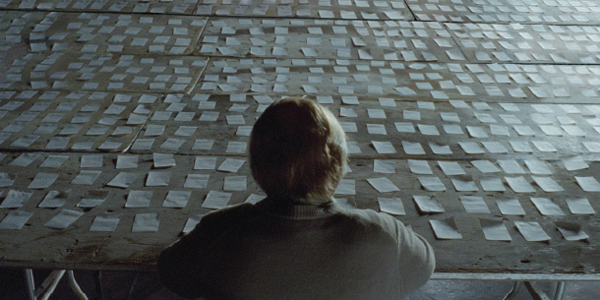LIfe is one big palindrome.
 Do we like things because the design of ourselves supports it? Are our choices preordained by the choices we made in our formative years? If we invoke change in our lives is it merely an illusion? In Charlie Kaufman’s new movie Synecdoche, New York, (also his directorial debut) life is fractal in nature — self mimicking, confusing and possibly self delusional. Kaufman’s vision is bleak yet hopeful. Rather than celebrate the typical cinematic conventions of Hollywood where characters experience sweeping moments of ecstasy and sorrow, Synecdoche reveals life to be broad swath of perpetual self-imposed suffering where joy comes in small, compartmentalized, quiet fleeting moments and mostly near the end of life. On the face of it, his representation would seem terrible and depressing, yet somehow I found it reassuring.
Do we like things because the design of ourselves supports it? Are our choices preordained by the choices we made in our formative years? If we invoke change in our lives is it merely an illusion? In Charlie Kaufman’s new movie Synecdoche, New York, (also his directorial debut) life is fractal in nature — self mimicking, confusing and possibly self delusional. Kaufman’s vision is bleak yet hopeful. Rather than celebrate the typical cinematic conventions of Hollywood where characters experience sweeping moments of ecstasy and sorrow, Synecdoche reveals life to be broad swath of perpetual self-imposed suffering where joy comes in small, compartmentalized, quiet fleeting moments and mostly near the end of life. On the face of it, his representation would seem terrible and depressing, yet somehow I found it reassuring.
The movie is centered on a middle-aged playwright living in Schenectady, New York named Caden Cotard. With that little knowledge there is already a rich landscape from which Kaufman can work. Cotard’s name (played by the extraordinary Philip Seymour Hoffman of Fairport, NY fame) is a reference to a rare neuropsychiatric disorder called Cotard delusion. According to Wikipedia it is when “a person holds a delusional belief that he or she is dead, does not exist, is putrefying or has lost his/her blood or internal organs.” The first name Caden is Welsh for “spirit of battle”, and so Kaufman reveals the core of Synecdoche, NY - a man’s battle with his own delusional self.
Like every Kaufman film written to date, Synecdoche is filled with strange characters, surrealistic visuals and deals with time in a profound way. What makes this film different is it’s intensity of intellect and grand landscape. Synecdoche is one long Zen koan. It explores jealousy, love, despair, dying and the creative process. It examines the ordinary searching for extraordinary answers to questions that are likely unanswerable. Finally, it is a film that spends the necessary time, both actual and filmic, peeling away the layers of one very strange, yet familiar character — Cotard. This is a film, like Kaufman’s other work, that will require multiple viewings to uncover all the various layers. With each viewing my life will have changed and moved forward in time and therefore change the impression I have of the film just like the film portrays.
By all means, if you have the opportunity, go see Synecdoche, New York. Allow yourself to simply sit and let the movie unravel. The enigma’s are there but the real depth of the film is how surprised you will be to think more deeply about your own life and perhaps let go of your own expectations and self delusions.
“The only reason for time is so that everything doesn't happen at once.” — Albert Einstein